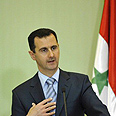
Assad: Resistance leads to armament
צילום: רויטרס
Assad says still believes in peace with Israel
In electronic interview to New Yorker, Syrian leader explains his country's stand on negotiations with Jewish state. He clarifies there will be no territorial compromises, says dialogue with Damascus must be separated from other regional problems. Iran is not part of peace process, he states
WASHINGTON – Syrian President Bashar Assad referred in a recent interview to the New Yorker weekly to the possibility of peace with Israel, clarifying that he is interested in continuing the negotiations.
In an electronic interview with journalist Seymour Hersh, Assad said, "We have to wait a little while to see how things will evolve and how the situation will change. We still believe that we need to conclude a serious dialogue to lead us to peace.”
The email correspondence between Assad and Hersh took place following the Israeli offensive in Gaza and the recent developments in the Middle East. The Syrian president conveyed a message of peace, but clarified that Israel was "doing everything possible to undermine the prospects for peace."
In the New Yorker interview published Monday, Assad added that the land was non-negotiable and that the Israelis were aware of the fact that the Syrians had no plans to negotiate on the 1967 border.
He said, however, that there was room for compromises on the nature of relations, water and "all other things."
President Assad said the peace process must be separated from other issues like Iran and the armament of Hizbullah and Hamas, and expressed his support for the terror organizations' struggle.
If Israel wishes to discuss the basic problems – the situation in the West Bank and Gaza, he said, it must not waste time on discussing the shipping of weapons to Hizbullah or Hamas. He added that any place with resistance in the region will have some kind of armament. It's that simple, he said.
According to Assad, "Hizbullah is in Lebanon and Hamas is in Palestine. If they want to solve the problem with Hizbullah they must talk to Lebanon. They must discuss Hamas with Gaza."
Iran is not part of the peace process in any case, he added. "It's peace between Syria and Israel."
Message to Obama: Fighting joint enemy
Assad's correspondence with the American journalist gave the impression that the Syrian president was urging the Americans to enter a dialogue with Damascus without any preconditions. The Syrians understand that the United States is not demanding the shutdown of Hamas' offices in Damascus as a condition for a dialogue, but that Syria will serve as a mediator with the Hamas leadership.
The Syrians are saying that the Obama administration is currently working to determine the extent of Syria's ties with Hizbullah.
Hersh wrote that those involved in the process believe that a peace agreement between Israel and Syria would include compensation to Israelis living in the Golan Heights and access to the land.
Assad, in response, asked not to put the cart before the horses. You discuss everything after peace and after receiving your lands, not before, he wrote. His message to Obama is that Syria is a secular state, which is fighting together with the US against a joint enemy – al-Qaeda and radical Islam.
Hersh quotes Martin Indyk, who served as American ambassador to Israel during the Clinton administration and is considered close to US Secretary of State Hillary Clinton. According to Indyk, "There are a lot of people going back and forth to Damascus from Washington saying there is low-hanging fruit waiting for someone to harvest.”
Senator John Kerry, the chairman of the Foreign Relations Committee, who met with Assad in Damascus in February, also spoke of his positive feelings.
“He wants to engage with the West,” Kerry said. “Our latest conversation gave me a much greater sense that Assad is willing to do the things that he needs to do in order to change his relationship with the United States. He told me he’s willing to engage positively with Iraq, and have direct discussions with Israel over the Golan Heights—with Americans at the table. I will encourage the administration to take him up on it."










